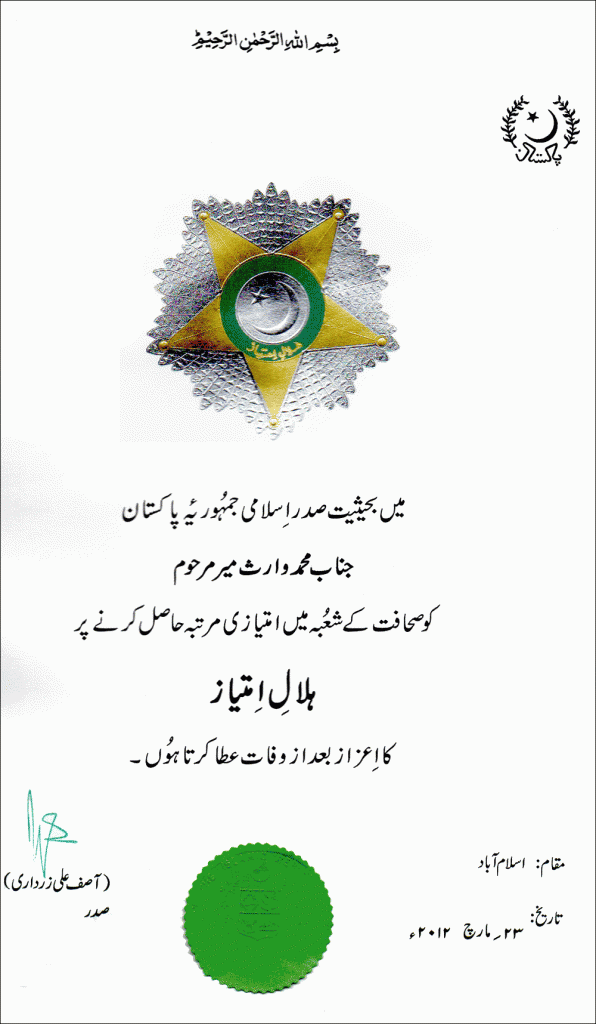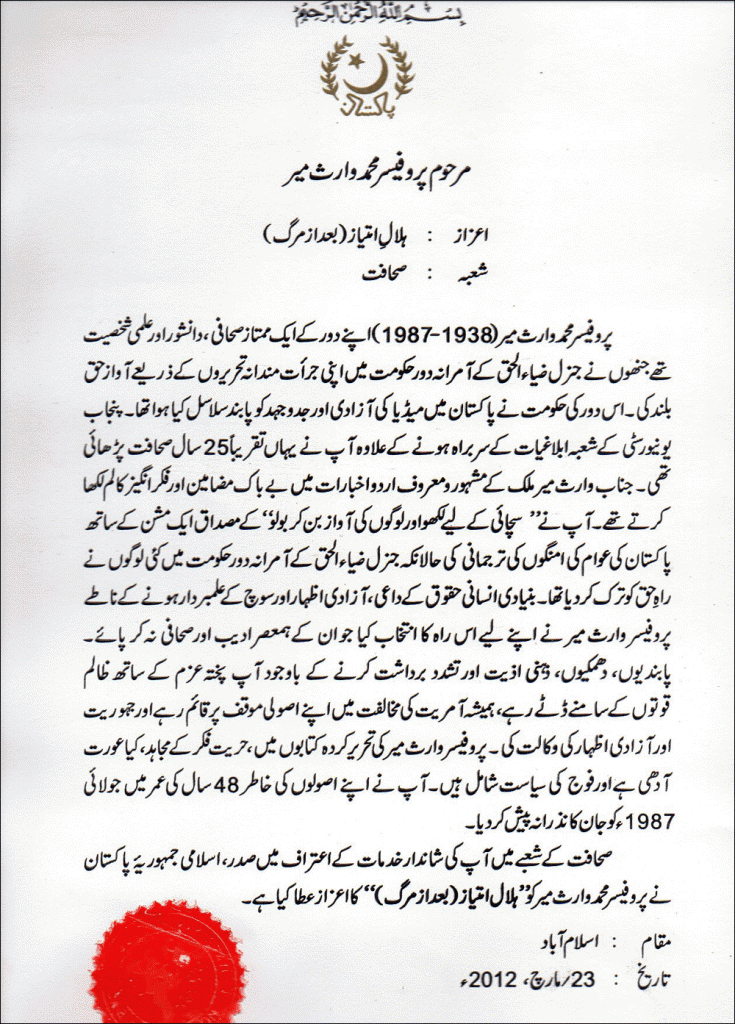Prof Mohammad Waris Mir (1938-1987)
Prof Mohammad Waris Mir, born on November 22, 1938, was an eminent Pakistani writer, journalist, intellectual, and academician of his times who is recognized for his courageous struggle to uphold the cause of democracy and press freedom through his bold writings during the dictatorial era of Pakistan’s third military ruler, President General Ziaul Haq. Speaking out at the behest of the people of Pakistan with a mission – ‘to write for the posterity, to speak as the people’s voice’ – was a task not many could take up in those oppressive days.
Waris Mir completed his studies up to college from Murray College, Sialkot, a city of Punjab which is known for its intellectuals in Punjab province of Pakistan. (Poet of the East, Allama Dr Mohammad Iqbal’s city). After doing Master’s in Journalism/Mass Communication in 1964 from the University of the Punjab, Lahore he joined the same department as a lecturer in 1965. He completed his M. Phil in Journalism from the City College University in London in 1976. He was thrice appointed the Chairman of the Mass Communication Department in the University of Punjab where he taught for 25 years. Besides that, Prof Waris Mir used to write fiery articles and columns for many leading Urdu newspapers of the country. He wrote extensively on all important national and international issues of his times, especially in the 1970s and 1980s. It was the firmness of his scholarly writings which used to appear in the country’s largest circulated Urdu newspaper “Jang” that earned Waris Mir soaring popularity amongst the readers, especially during General Ziaul Haq’s martial law period when the latter tried to Islamize the Pakistani society by enforcing Islamic Shariah.
Being a staunch believer of the basic human rights for freedom of thought and expression, Prof Waris Mir chose to take the road that most of his contemporary writers did not dare to take, especially during the Martial Law periods of President General Ayub Khan and General Ziaul Haq. Despite facing censorship snipping, threats, mental torture and vandalism, he stood his ground firm against all odds, upholding his principled stance of opposing dictatorship and backing democracy and freedom of expression. The books authored by Prof Waris Mir in Urdu language included “Hurriyat-e-Fikar Kai Mujahid” (The warriors of the intellectual freedom), “Kaya Aurat Aadhi Hai” (Is woman half the human?), and “Fauj Ki Siasat” (The politics of the Army).
Waris Mir spent all his life striving for truth, justice, democratic principles, freedom and liberty of thought and died with his boots in July 1987 at a young age of 48 while confronting the Zia dictatorship. He fought a combat alone with the dictator of his times and set an example to follow. What Waris Mir wrote and how he wrote, makes him an icon par excellence who continues to live on through his writings. At the time of his untimely demise at a young age, Prof Waris Mir was at the climax of his professional career as a writer. His writings about the contemporary politics, army’s meddling in politics, feministic issues, cultural reforms, religious beliefs, philosophical ponderings, literary references and even historical background remain relevant because they were not directed towards one individual — they were rather directed towards educating the people about the ills of tyranny, the psychological problems that the military tyrants possess. His writings were not just aimed to stand apart from the rest of the literary and pseudo-intellectual crowd, but were rather aimed at awakening a sense of liberation amongst the despondent public.
Being an intellectual with moral courage and a mighty heart, Waris Mir was not ready to become a silent spectator to the brutality of a dictator and stabbing of democracy. Being a man of principles and truth, he did not put a stop to the pinching truth that flowed out of his pen. Most importantly, what Prof Waris Mir wrote and how he wrote, makes him an icon par excellence. The times, in which he wrote, many of the country’s leading intellectuals and writers had compromised on their principles and professional credence. Freedom of the press is certainly not an issue for all the writers but it was ‘the’ issue for Waris Mir.
Waris Mir died of a sudden cardiac arrest at the young age of 48 under mysterious circumstances. He was laid to rest in the Punjab University graveyard close to the New Campus Underpass which was renamed as the Waris Mir Underpass. He was decorated with Pakistan’s highest civil award – “the Hilal-e-Imtiaz” or the Crescent of Excellence (posthumous) on March 23, 2013 by the state of government in recognition of his meritorious services in the field of journalism and for furthering the cause of democracy through his thoughtful writings. The Government of Bangladesh also decorated him with the country’s most prestigious civil Award, “The Friends of Bangladesh Award” in April 2013 for writing meticulously and fearlessly against the Pakistani military action of 1971 against the civilian population of the then West Pakistan [that later became Bangladesh].
Prof Waris Mir was a son of an Urdu/Persian/Punjabi poet and teacher Mir Abdul Aziz. His roots can be traced back to Jammu & Kashmir, administered presently by India. Waris Mir’s widow, Mumtaz Mir, who was a house wife, passed away on 10 December 1993. Three of Waris Mir’s sons – Hamid Mir (Geo Tv), Amir Mir (The News) and Imran Mir (Pakistan Television) – are journalists while the fourth – Faisal Mir – is a businessman. The daughter – Huma Mir is an educationist.
http://en.wikipedia.org/wiki/Mohammad_Waris_Mir



